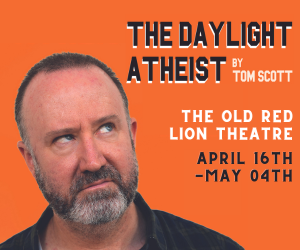For those who don’t know much about mid-20th
century Russian literature – I’m sure there must be one or two – satirical
playwright Evgeny Schwartz’s 1943 play,
It’s not silly enough, not moralistic enough and, quite frankly, not clever enough to maintain interest for most people over Nursery age.
To bring the meaning up to date and maintain relevance, writer Rory Mullarkey has kept the Knight / Dragon metaphor but replaced a couple of teeny-tiny points; the country and the society-changing underlying message. Now we are in a ‘little island, not too different to our own’, inhabited by characters named primarily after their working skill (Miller, Butcher, Brewer – no Candlestick Maker sadly) and covering all colours, accents, sizes and possibly sexualities. Sort of like if Britain was designed by those who created the Benetton ads of the mid-eighties – but without the thought.
It’s possibly a misnomer to say these are really characters though, as for the most part, the large supporting cast of around 15 generally represent roles rather than inhabit them, as though they each picked a random job title from one bag and a single personality trait from another. And the times when they come together as the country en masse, rather than a strong and cohesive ensemble, it feels like we are watching under rehearsed and unwritten workshops as they stumble over each other’s lines and nearly move together but never quite all together.
I do accept that there is some need for this simple signifier of roles as the sprawling set around them changes over time and times. In this version, George leaves twice and returns a year later each time – but for the crowd, centuries have passed, yet they remain the same people who have only been through 12 months of their lives. After the initial dragon-slaying (plot spoiler?), he leaves them in their humble “Ye Olde Englande of Time Past...(e?) beginnings to be free and do whatever they desire. His return is to the Industrial Era, where the dragon has come back as the evil notions of ‘Profit, Loss and Tax Ledgers’ that now rules over them and stops them caring for each other. And the next year (post-interval, but post-same ‘release to be free for themselves’ – the structure does get quite repetitive quite quickly) it is ‘Non-Specific Modern Day’ where getting pissed, watching ‘da match’ and being mutually proud / resentful of ‘Britishness’ has made the metaphorical dragon intrinsic to their existence. Cos he’s kinda the bad stuff in us all. Like Voldemort... or a fully-rounded personality.
At the centre of all this is George himself – played by John Heffernan as the sort of likeable, campy, naive buffoon who is part Blackadder (the Tim McInnerny and Hugh Laurie parts) and part Sir Lancelot from Monty Python’s Spamalot. His enjoyment for the jokes and silliness he has to play with as he frolics around the stage makes much of this simply unadulterated fun – only struggling in the last act when he’s given the task of reminding them (us) to be proud and positive and ourselves. That’s sort of the message – and also the most cringeworthy of scenes.
Opposite him, Julian Bleach’s sneering, haunched, raspily sibilant Dragon is just the right side of panto villain – with the undercurrent recognition of his Davros voice managing to maintain menace. Again it’s in the no-place for subtlety third era (or second act) when he’s somewhat forced to moralise, that his playing becomes rather chained into only doing.
There’s fun to be had here and it’s at its best when knowingly self-aware and includes us in the joke - on ourselves and on the genre. But at nearly three hours and pretty much only one hour of structure, rinsed and repeated, there’s not enough fun to keep it going through such endless group scenes as the narration of the first George vs Dragon battle (as the ensemble stare at the non-action behind us, sway and begin every sentence with never-spoken-in-life “Look how he...” and “I think he’s about to...”s) and the football match watching pub crowd (same staring, swaying and sentence prefixes but now with a sprinkling of chants). These are but two examples – each of which lasting at least three timings too long - that are so toe-curling that you wonder why noone said stop earlier. Perhaps the really hidden message here is that there are dragons – bad people – at the core of theatre too... perhaps..
If Saint George and The Dragon was the total cast list as well as the title, the cuts to the cast and the scenes not focussed primary on these two – along with the requisite time saved – may make this a silly fun show with a dash of morality for good measure. As it is, it’s not silly enough, not moralistic enough and, quite frankly, not clever enough to maintain interest for most people over Nursery age. Whilst there may have been some intention of a similar – acceptedly less risky – objective to Schwartz’s, it’s turned out more like one of those movie soundtracks labelled “inspired by”, where in place of any actual tracks from the film, they end up being packed with space fillers of songs that have nothing more than similar titles to its name; it can be enjoyable in parts – but you’re glad of the Skip button to pass through most of it.









